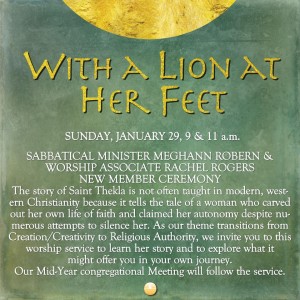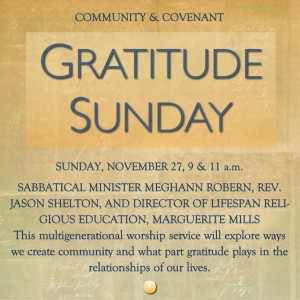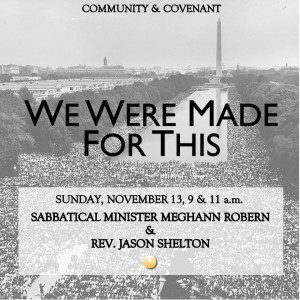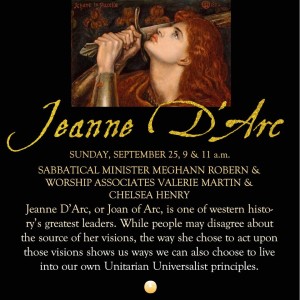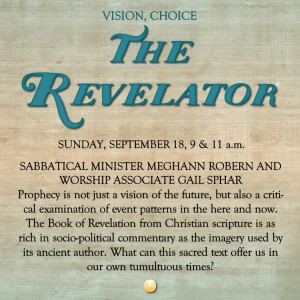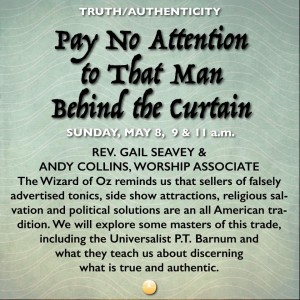Watch and listen to the sermon on Facebook:
“It is easy to admire someone of grace and elegance, to have one’s eye caught by the sleek drape of a skirt or by a sidelong glance across the room. In certain circles it is possible to live through an entire affair which is composed of nothing more than brittle witticisms. But the love of the spirit comes when the dark yin of the soul is exposed in the lover’s sight; vanities, insecurities, those tender crevices that hold the potential of real pain.” That quote is from a short story by Bruce Sterling, called “The Beautiful and the Sublime.” I couldn’t tell you now what the plot of the story is to save my life, but this quote has stayed with me for over ten years.
And while we’ve had this topic planned for weeks, thinking about how and when we allow ourselves to be vulnerable, or to receive the vulnerability of others with love, now we are examining these patterns of our lives in the wake of a mass shooting in Las Vegas, Nevada, one of the largest in US history. The death toll currently stands at 59 people, with 527 injured.
And to those of you who think that something like this could never happen here in Canada — you’re wrong. It wouldn’t be next week, of course, or even next year, or in five years — laws take time to be changed –but unless we dig deep into the reasons why white men are taught by our embedded systems that this is the only “solution” to whatever they are experiencing — this toxic culture will seep across our border. It has already begun — just two months ago we experienced racist, facist graffiti painted all over our city, not just our sign, the same day that a white supremacist plowed a car into people protesting hate in Virginia. That was not a coincidence.
And while it’s so important in our dominant white culture to recognize the need for vulnerability, to learn how to let other people in to our tender crevices, where we are raw and sore, Sterling’s use of yin and yang in this metaphor gives us insight to a layer deeper than what he merely writes on the page. The essence of yin and yang in Taoism isn’t that one is necessarily better than the other, but that they each part are the larger whole. They need each other to exist, and humans, as part of the larger multiverse, are neither yin nor yang inherently but contain both within each of us. Balance is what brings us harmony, and because we are living beings, staying in balance is a constant process.
So here we are. Diversity is one of our strengths, and yet it brings with it complexity and the potential for real harm. And remember, diversity includes gender identity and expression, class status, education level, physical ability, cognitive ability — the list goes on. We are, each of us, a unique collection of locations on a multitude of spectrums. That’s pretty amazing. But it also means that sometimes, we have to be as intentional about making room for others around us as we are about living into our own potential. Our reading today, by Lao-Tse, speaks of the space within, the empty places, as being the most useful. Sometimes, listening to another’s pain is just as important, if not moreso, than sharing our own. The problem comes when we always do one at the expense of the other.
And here is where awareness of our systems and what the dominant culture is come into play. Some of us are taught that we take up too much space just by existing — women, people of colour, tall people, fat people, etc. When we attempt to share equal space, we are told that we are asking for too much. That’s why you’ll hear the common counter-argument to feminism is that feminists are actually seeking superiority, not equality, which couldn’t be further from the truth. When one is accustomed to certain privileges, equality can often feel like an attack.
And even our metaphor today, of yin and yang, isn’t immune from sexism. Yin is traditionally identified with the feminine, while yang is the masculine. In our dominant Western white culture, to be emotional, to be vulnerable, to be sensitive is attributed to the feminine, and is more often than not framed as a bad thing — as weak. You hit like a girl. You scream like a girl. Man up. You don’t have the balls to do that. In our dominant culture of toxic masculinity woman can wear pants but men still cannot wear skirts. And if you’re genderqueer? You risk life and limb just by going outside your home.
The late night talk show host Jimmy Kimmel has been using his platform of privilege on his show to rail against the atrocities of the current US government, including how their health care system kills people. He has cried on camera, in front of millions of people. In retaliation, someone has purchased bus bench ads, attempting to attack Kimmel by calling his show “The Estrogen Hour” — implying that this feminine hormone, and that demonstrating genuine emotion for the deaths of millions of Americans, is somehow a bad thing.
So I would offer to you today that finding ways to be vulnerable with each other, to develop emotional intelligence about how we feel and why, is a form of resistance to the status quo. Acknowledging the global majority cultures that embrace our emotions as valid sources of experience is a form of resistance to white supremacy. Learning how to be vulnerable, to embrace the dark yin in each of us, will not only make us better at being human with each other — it will also heal the world. It will save lives.
But what does it mean to “learn to be vulnerable”? Can’t we just do it by talking about what’s hurting us or bothering us at any time?
No.
We cannot become yin at the exclusion of yang. We must seek balance. We cannot go around bleeding on those around us all the time, because then we have failed to make room for those who are also bleeding — sometimes their wounds need more immediate attention than our own. And while all our blood may look the same, our wounds are in different places and are of different degree. Someone who is bleeding from stepping on a nail has very different needs from someone who’s been shot. Just because we acknowledge that all of us bleed, that all of us have wounds, doesn’t mean that our suffering is the same. It doesn’t mean that all our needs can met in the same ways.
The Rev. Sandra Fees said, on the topic of learning to be one’s true, authentic self: “This means revealing what we so often try to keep hidden from others and allowing ourselves to be seen. Now I want to make an important distinction here. This is really important. Being seen is not the same as dumping ourselves on other people. It is not about oversharing deeply private information with people we don’t know or barely know. Being vulnerable requires having good, appropriate boundaries and trust with people in one’s life. The idea is to build deeper connections, not to bare the soul to a stranger or passing acquaintance. When someone share their deepest struggles and secrets with someone they just met, that has more to do with desperation, attention-seeking, and pain than being oneself. And it is unlikely to lead to any kind of deeper connection and intimacy. It is more likely to lead to an experience of alienation. […] True vulnerability requires some thought and consideration.”
So here we are. Right now, I realize, at this point in the sermon, the message seems to be “Be vulnerable, it will save the world, but don’t be too vulnerable, or you’ll mess everything up for everyone.” No pressure.
So authentic vulnerability requires thought and consideration. What does a congregation do with that? It’s true, of course, but at the same time this is also supposed to be our caring, supportive community. Unitarian James Luther Adams once said, church is where we practice what it means to be human. Being human is hard. And practice means not we’re not getting it right the first time around. Practice means getting better by doing it over and over again.
And the way we do that, with this multitude of different people with different life experiences, is by holding to our covenants — the ones we make as a larger community, and the ones we make in our smaller groups within. And those covenants will need to be rewritten and renewed, as we learn more about how to be together and make room for each other. Nothing is carved into stone, because that would hold us back from our evolution.
And, you have me. Right now, I’m the one you can bleed all over until the blood clots and you can move towards balance once again. It’s one of the most important roles I have as your minister — to hear your stories. All of them. You can bleed on me.
And to make sure the whole congregation’s needs are met the pastoral care team and I are working on rebuilding and restructuring this part of our church’s ecosystem — to recruit and train pastoral care associates who will listen and support you when you need to be vulnerable.
But even then, I’m not psychic. And, neither is anyone on the pastoral care team right now — that I know of. I know I’ve only been here two months, and that’s not a lot of time to build up trust. So I’m going to keep working at it. But I also need you to reach out to me, to be vulnerable even in the asking to be heard. I know from personal experience that that is one of the hardest things to do. And I believe in you — in your capacity for love, in your willingness to be loved, and in your commitment to making the world better for everyone else around you.
On this Thanksgiving weekend, as we here give thanks for this community in which we gather, for the earth and the sea and the sky, and for the ties that bind us to each other, remember: “it may be rainin’, but there’s a rainbow above you. You better somebody love you, before it’s too late.”
May it be so.
